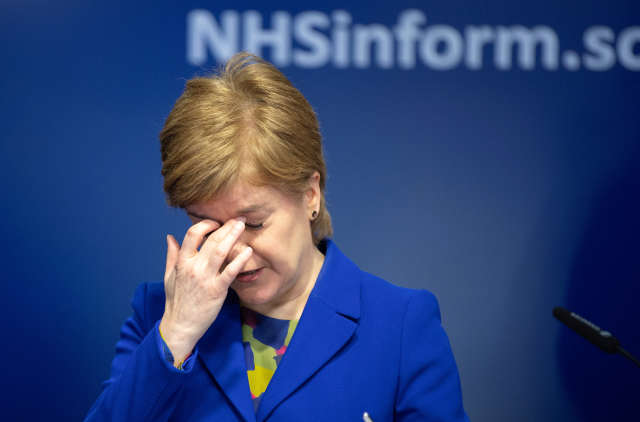Arrested on the morning of June 11, the former leader spent seven hours in police custody before being released without prosecution. His questioning, as part of an investigation into the finances of his political party (SNP), is a new blow for the Scottish separatists.
“The police investigation into the finances of the Scottish National Party (SNP) has woven a web in which, inevitably, Nicola Sturgeon also found herself trapped,” observes El País.
The former leader and leader of the SNP, who had resigned as Prime Minister in mid-February to everyone’s surprise, “was arrested by the police on Sunday morning and then released without charge pending further investigations, after s ‘to be voluntarily presented to the police station’, specifies The Guardian.
In April, her husband and SNP chief executive, Peter Murrell, and party treasurer, Colin Beattie, were arrested and later released as part of the same investigation. Both had resigned from their duties in the wake of their interrogation.
The police are trying to find out where the approximately 700,000 euros collected by the SNP for the organization of a new referendum on Scottish independence have gone, while the coffers of the party are almost empty and the referendum does not is not on the agenda.
In a statement released after her custody and quoted by The Scotsman, Ms Sturgeon claimed her innocence. “Finding myself in the situation I was in today, despite being convinced that I did not commit any crime, is both shocking and very distressing,” she said. I know beyond a shadow of a doubt that I am innocent of any wrongdoing.”
Disgrace
Sunday’s events “constitute a spectacular disgrace for Ms. Sturgeon, a popular political figure who served for more than eight years as First Minister of Scotland until her resignation”, judge The New York Times.
But the Corriere della Sera – convinced that the former Prime Minister renounced power “because she knew what was looming on the horizon” – is hardly surprised by her legal setbacks. “The financing scandal is the logical conclusion of a management of public affairs which had transformed the independence movement into a kind of party-state, managed in an opaque and private way”, writes the Milanese daily.
On Sunday evening, several MPs – including one from the SNP – “called for [Ms Sturgeon] to be suspended from the party she led for nine years”, reports the conservative daily The Daily Telegraph. A subject that the interested party is careful not to mention in her press release.
But the BBC recalls that there is “a precedent”: when the predecessor and mentor of Ms. Sturgeon, Alex Salmond, “was accused of sexual assault in 2018, he immediately announced his resignation from the party, the time to prove his innocence. He was eventually cleared, but never returned to the SNP.”
Political deadlock
The ex-Prime Minister, quips the British broadcaster, could nevertheless “prefer the approach of Colin Beattie, who resigned from his post of treasurer of the SNP, while remaining a member of the party, after his own arrest and release” .
Ms Sturgeon’s fate risks becoming one more headache for her successor as party leader, Humza Yousaf, who is already dealing with the SNP crisis. Because the scandal “coincides with the political impasse in which the separatists find themselves”, observes Le Temps.
“While the polls still give around 47% support for independence, at a more or less constant level, the SNP has been struggling for years with an unresolved problem: it cannot organize a referendum on independence without ‘endorsement’ of the Parliament of London. “And at the moment neither the ruling Tories nor Labor are prepared to grant it to him.”
The Swiss daily acknowledges that it is “too early to declare the death of the independence movement”, but “between Westminster’s opposition to a referendum and the current scandal, the probability of seeing Scotland officially separate from the United Kingdom seems to have gone down significantly.
This article is originally published on courrierinternational.com


